As Google expands its new AI chatbot Bard across its products, doubts about the technology’s capabilities are emerging behind the scenes.
Recently leaked conversations between Google employees involved in developing Bard reveal uncertainties within the company about the chatbot’s effectiveness and whether the massive investment required is paying off.
This news, first reported by Bloomberg, raises fresh questions about Bard’s challenges.
Our report explores the private critiques of Bard coming from its own creators and what this means for the chatbot’s future.
Googlers Question Effectiveness Of Bard
In an invitation-only Discord chat, Google product managers, designers, and engineers have debated whether the resources required for Bard are worthwhile.
“My rule of thumb is not to trust LLM [large language model] output unless I can independently verify it,” said Dominik Rabiej, a Bard senior product manager, in July. “Would love to get it to a point that you can, but it isn’t there yet.”
In August, others like Cathy Pearl, Bard’s user experience lead, questioned the practical value of such AI systems. “Like really making a difference. TBD!” she said.
Integrating Bard Into Google’s Ecosystem – Too Soon?
Google unveiled Bard in March as a rival to OpenAI’s popular ChatGPT chatbot.
The company added new capabilities in the following months, like analyzing images and responding in various languages.
Last month, Google announced the biggest expansion yet by connecting Bard to products like Gmail, Maps, and YouTube. However, the rollout has been plagued by complaints of Bard providing false information and dangerous recommendations.
The same day as the major expansion, Google added a search button so users could fact-check Bard’s responses.
Critics inside and out have accused Google of rushing to keep up with competitors while ignoring ethical issues, including the treatment of low-paid contractors training Bard.
Ensuring Bard succeeds is crucial for Google. Its core search business generates about 80% of parent company Alphabet’s revenue, but the rise of AI chatbots threatens to disrupt its dominance.
The Future Of Bard
The candid Bard discussions provide unique insight into the thinking of those building the technology.
While many users hyped up Bard’s capabilities, Google employees clarified its limitations.
“Bard, as any large language model, is generative — it is not looking up stuff and summarizing it for you, it is generating text,” said Rabiej recently, stressing the need to verify responses.
Others raised concerns about Bard’s development costs, the potential to spread misinformation, and the project’s massive computing requirements.
In a statement to Bloomberg, Google said debating Bard’s strengths and weaknesses was a routine part of improving the product based on user feedback.
What Does This Mean For Bard Users?
The revelations from the private Bard Discord chat have several implications for businesses and marketers using Google’s AI chatbot:
Exercise Caution
Google employees advising each other not to trust Bard’s outputs suggests marketers should also exercise caution and verify any information the tool provides.
Temper Expectations
The doubts voiced by Google’s team about Bard’s usefulness indicate it may not be the magical marketing solution some have hoped for. Marketers should temper expectations about Bard’s capabilities to generate ideas, create content, and automate tasks.
Watch For Improvements
Google appears committed to enhancing Bard over time. As the team works to reduce hallucinations and improve accuracy, the product could become more beneficial for marketers. But it’s unclear how long that will take.
Monitor Limitations
New limitations around Bard’s abilities may emerge as it gets deployed more widely. Marketers should stay on top of announcements to understand if certain use cases become restricted.
In Summary
The revelations make clear that marketing teams should take a cautious, measured approach to integrating Bard into their workflows for now.
As Google improves the AI, it may become more versatile and trustworthy. But healthy skepticism is warranted in the interim.
Featured Image: T. Schneider/Shutterstock





![AI Overviews: We Reverse-Engineered Them So You Don't Have To [+ What You Need To Do Next]](https://www.searchenginejournal.com/wp-content/uploads/2025/04/sidebar1x-455.png)